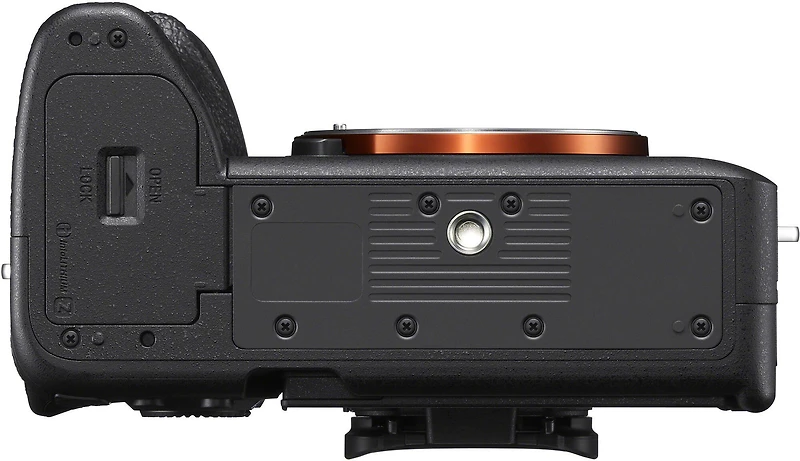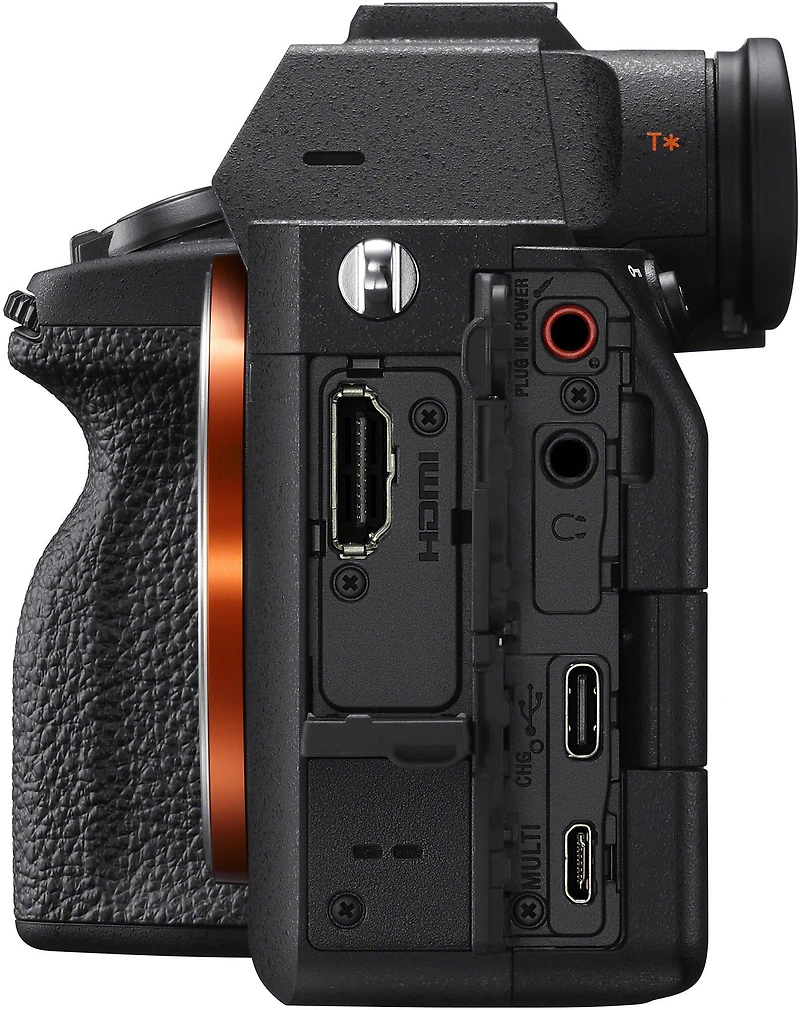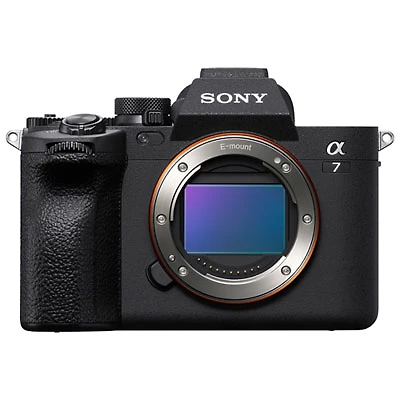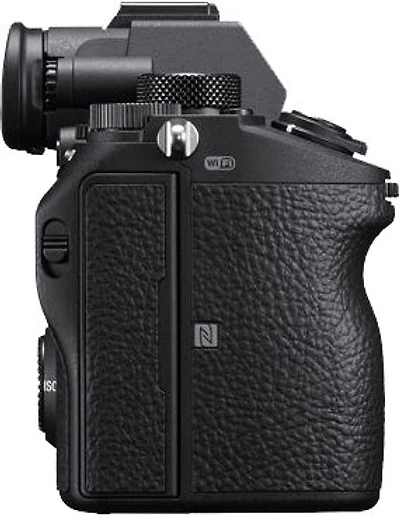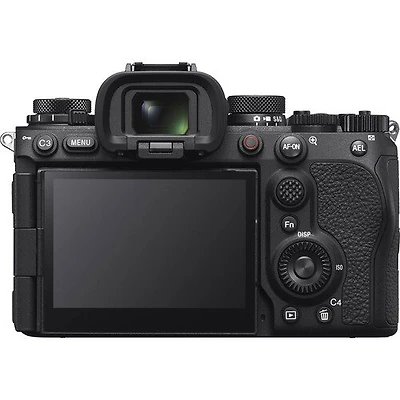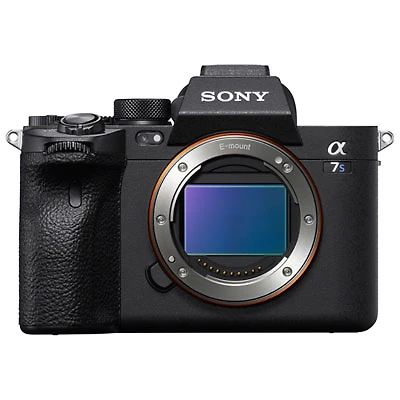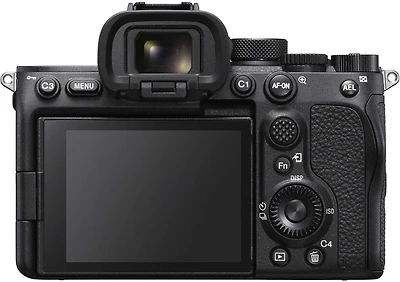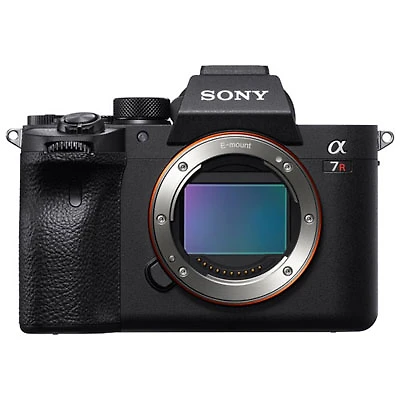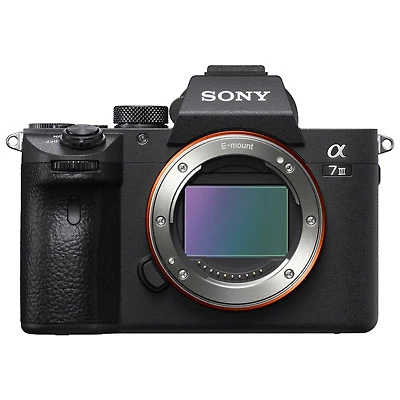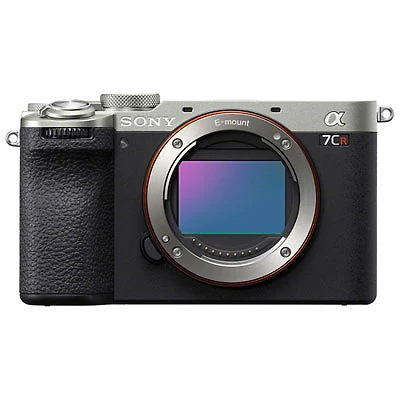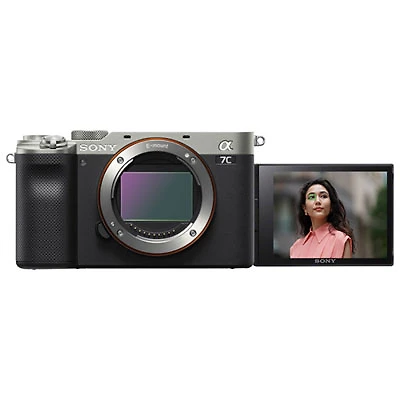
Gifting Made Simple
Too many options? Click below to purchase a Coquitlam Centre eGift Card that can be used at participating retailers at Coquitlam Centre.Purchase HereHome
Sony A7 IV Full-frame Mirrorless Interchangeable-Lens Camera - Body Only
Kerrisdale Cameras
Loading Inventory...
Sony A7 IV Full-frame Mirrorless Interchangeable-Lens Camera - Body Only in Coquitlam, BC
From Sony
Current price: $3,199.99
Kerrisdale Cameras
Sony A7 IV Full-frame Mirrorless Interchangeable-Lens Camera - Body Only in Coquitlam, BC
From Sony
Current price: $3,199.99
Loading Inventory...
*Product information may vary - to confirm product availability, pricing, shipping and return information please contact Kerrisdale Cameras
Beyond basic.
For a new generation of imagemakers.
With groundbreaking performance in both still and movie recording, the α7 IV is the ideal hybrid, providing breathtaking imagery along with on-the-spot delivery and distribution. The α7 IV is a camera designed to bring to life the artistic visions of today’s creators.
Newly developed 33.0‑MP17 back-illuminated CMOS image sens
The full-frame Exmor R CMOS sensor delivers outstanding speed and superb image quality. The use of copper wiring contributes to higher transmission speeds and faster AD conversion, while fast sensor readout enables 10-bit 4:2:2 4K recording at up to 60p. The sensor also provides improved colour reproducibility, low-noise performance at all sensitivities, 15-stop dynamic range on stills and increased AF precision and focal stability.
BIONZ XR image processor for up to 8x processing speed
The BIONZ XR engine, also used in the flagship α1 and α7S III models, provides up to an 8x increase in processing speed. The engine concentrates real-time processing of AF, image recognition and image quality adjustment to minimize processing latency, for greatly increased movie and still processing power. User interface, network and file management processing is distributed in order to deliver fast response regardless of real-time processing load.
Beautiful image rendering with low noise
Visible benefits of the powerful new 33.0‑MP sensor and engine go beyond mere numbers. They include soft, natural-looking human skin textures, a stunning level of detail in landscapes and scenery and better colour reproduction, with higher subjective resolution resulting from improved algorithms. The standard sensitivity range of ISO 100-51200 is expandable to ISO 50-204800 for stills and ISO 100-102400 for movies, with low-noise performance throughout.
Set the mood, in-camera, with Creative Look
Broaden your creative palette with a selection of ten Creative Look presets. You can easily impart a particular mood in your still images, movies and live streaming and all preset selections are available in-camera without post-editing, so you can share your vision immediately after shooting.
4K 60p recording, 4:2:2 10-bit recording
The α7 IV gives you an impressive range of video recording options. Full pixel readout without binning allows 4K 60p recording and when recording 4K movies at 30p, full-frame 7K oversampling produces high-resolution, highly detailed 4K. 10-bit 4:2:2 video can be recorded internally, allowing fuller, more natural gradations and greater editing freedom. The XAVC HS file format provides roughly twice the coding efficiency of MPEG-4 AVC/H.264.
Smoother gradation rendering with 10-bit HEIF recording
The α7 IV offers HEIF (High Efficiency Image File) still-image encoding, in addition to conventional RAW and JPEG. Smooth 10-bit gradations provide more realistic reproduction of skies and portrait subjects and the use of 10-bit depth minimizes degradation of image quality when editing. HEIF still images recorded in HLG mode can be played back on a compatible BRAVIA 4K TV via an HDMI connection to display images with an extraordinarily wide dynamic range.
Beautiful colour expression made simple, with S-Cinetone
The α7 IV supports S-Cinetone, based on expertise gained through development of the VENICE CineAlta camera. This look is responsible for the beautiful skin tones for which Cinema Line cameras like the FX9, FX6 and FX3 are widely acclaimed. It delivers natural mid-tones for healthy-looking skin colour, plus soft colours and gorgeous highlights. Because it’s in-camera, it’s easy to create a more expressive look for your movie imagery without post-editing.
Soft Skin Effect for bright and beautiful skin appearance
The built-in Soft Skin Effect makes skin look more beautiful, softening wrinkles, blemishes and dull patches while preserving liveliness in eye and mouth areas. Complementing the capabilities of the full-frame sensor, this feature can add appeal to live-streamed sessions, as well as enhancing still shots and movies. Four level settings are available, so you can adjust the degree of the effect as you wish.
S-Log for colour matching with professional video equipment
The α7 IV provides S-Log2 and S-Log3 gamma curves, with the latter allowing capture of 15+ stops of dynamic range. The S-Gamut3 and S-Gamut3.Cine colour gamut settings make it easy to match α7 IV footage with footage from VENICE digital cinema cameras or Cinema Line cameras like the FX6 and FX3. The native sensitivity when shooting S-Log is ISO 800 and it can be lowered by as much as two stops (ISO 200-640) below the standard range to achieve extra-low noise.
Optical 5-axis in-body image stabilization for 5.5-step compensation
The α7 IV’s high-precision stabilization unit and gyro sensors work with stabilization algorithms to achieve up to 5.5 steps of shutter-speed compensation, to maximize the performance of the camera’s 33.0‑MP sensor. This in-body stabilization allows effective use with a wide range of lenses. The live monitor view shows the stabilized still image while the shutter button is half-pressed, an especially helpful feature when using a telephoto or macro lens and it can be used in conjunction with the MF Assist and Focus Magnifier features.
Buffer memory supports continuous shooting and recording
Both the mechanical and electronic shutters allow continuous shooting at up to 10 fps with AF/AE tracking. The latest powerful processing engine and increased buffer memory allow faster writing to memory cards, so you can shoot more than 800 uncompressed RAW+JPEG frames (more than 1,600 altogether) or more than 1,000 compressed RAW+JPEG frames (more than 2,000 altogether, up to a full memory card). Increased processing power also allows you to change menu settings even while data is being written to the memory card.
Hand-held movie shooting with Active Mode
Active Mode uses the camera’s stabilization unit, gyro sensors and sophisticated algorithms for highly effective in-camera optical image stabilization during movie shoots. The powerful processing engine precisely detects the required amount of compensation for smooth stabilization in all formats, including 4K, without compromising the α7 IV’s compact size and mobility. And, because the gyro data is also recorded alongside the video, even more effective post-production stabilization can be applied for ultra-smooth shots using Catalyst Browse/Prepare software.
Fast Hybrid AF with improved speed, precision and tracking
Using a combination of phase-detection AF and contrast-detection AF, Fast Hybrid AF focuses precisely, even on small subjects or on people posed in front of a night-time background. A wide, dense AF area covers roughly 94% of the image area for both still and movie shooting with 759 phase-detection points, while the contrast-detection AF system uses 425 points. This vast collection of data is analyzed in real time by the latest powerful processing engine to achieve the AF system’s impressive results.
AI-based Real-time Eye AF and Real-time Tracking
The superior processing power of the BIONZ XR engine has led to improvements in both Real-time Eye AF and Real-time Tracking features. Improved face detection translates into 30% better eye-detection accuracy, while faster image processing yields higher accuracy when the subject is looking up, down or sideways. Real-time Tracking allows you to select your subject and then leave tracking to the camera, relying on the latest subject recognition algorithm and high-speed analysis of spatial data by the processing engine.
Bird mode for Real-time Eye AF, now available in movies
The Real-time Eye AF function is now capable of detecting the eyes of birds and tracking them in real time, for both still shots and movies. The BIONZ XR engine runs optimized AF and tracking algorithms to ensure uninterrupted tracking even for birds in flight, whose movement is hard to predict. Once you’ve selected a bird, the camera will automatically detect and precisely track that bird’s eye, whether the bird is perched or in flight.
AF control through touch operation
Touch Tracking lets you select a subject to track simply by touching the LCD screen, even while using the viewfinder, for more intuitive AF control for both still shots and movies. Easier focus operation is particularly helpful when you’re shooting movies alone or using a gimbal, allowing you to concentrate on composing your shots.
Visualize depth of field during movie shoots with Focus Map
The new Focus Map overlays focus information onto a live real-time display to show which areas are in or out of focus. Being able to clearly visualize depth of field in this way makes it easier to quickly set up your ideal focus point and depth of field during rehearsal. As a result, you can use the camera’s excellent video definition and fast lenses to create impressive shots with shallow depth of field.
AF Assist for seamless transitions to manual focus
The AF Assist function, inherited from the Cinema Line FX6, lets you seamlessly switch to and from manual focus during movie shoots. When this feature has been turned on, rotating the focus ring temporarily switches operation from autofocus to manual focus to allow you to deliberately shift your focus to a different subject.
Breathing Compensation for consistent angle of view when focusing
For the first time in the α series, the α7 IV provides compensation for focus breathing. Focus breathing is any change in a lens’s angle of view that corresponds to changes in focus. Sony’s original Clear Image Zoom technology is used to automatically maintain a consistent angle of view, for more movie-like focus transitions. This feature can be used in conjunction with Active Mode image stabilization to shoot stable, consistent imagery.
The latest mode-specific menus and customizable Rear dial R
The α7 IV’s menus are specific to either stills or movies and for easier navigation menus are configured to show three levels of hierarchy at once. Separate functions for stills and for movies can be assigned to various buttons and dials, including the new, freely customizable Rear dial R. With controls tailored to whichever shooting mode you are currently using, the flexible access provided by the Rear dial R contributes to greatly enhanced still- and movie-shooting efficiency.
Still/Movie/S&Q dial for quick access to hybrid capabilities
Befitting the α7 IV’s status as a true hybrid camera, it comes equipped with a dedicated Still/Movie/S&Q dial to instantly switch between movies and stills. The dial switches the menus, functions and custom settings of various controls between still and movie mode and settings such as aperture and shutter speed are also maintained separately for stills and movies. S&Q mode can also be selected, for fast access to slow-motion or quick-motion shooting.
Vari-angle LCD monitor for greater freedom when shooting
The large, side-opening 3.0-type 1.03-megadot touch-panel LCD monitor offers ample brightness for clear viewing in outdoor settings and its 3:2 aspect ratio makes efficient use of the display area. The vari-angle mechanism allows flexible positioning and framing for handheld shots, gimbal-mounted or documentary-style self-shooting or very low ground-level shots.
Communication features for easy sharing and distribution
The α7 IV is equipped with robust wired and wireless communication features for more comfortable sharing and distribution. In-body wireless LAN uses a 5‑GHz band in addition to the 2.4‑GHz band, for fast data transfer. Background FTP transfer of files can be set to occur automatically while shooting continues and a USB Type-C® connector supports fast SuperSpeed USB 10‑Gbps (USB 3.2 Gen 2) data transfer.
3.68‑megadot high-definition Quad-VGA OLED viewfinder
The α7 IV’s Quad-VGA OLED viewfinder provides roughly 1.6 times the resolution of the α7 III viewfinder, with a 37.3 ° FOV and a 23‑mm high eyepoint. With high resolution, improved electronic viewfinder image quality and fogging and dust resistance (including significantly improved internal fogging resistance relative to the α7 III), it is designed for clear and comfortable viewing in a wide range of shooting environments.
Instant real-time live streaming via USB connection
Live streaming is as easy as connecting to a computer through a USB connection and you can choose from four different output formats, including high-resolution 4K video. You can select whichever configuration is best for current network conditions and the devices used and simultaneous internal recording is also available, giving you broad flexibility to cover a wide variety of needs.
Heat management
To allow extended continuous recording, efficient heat dissipation is provided by Sony’s proprietary Σ (sigma)-shaped thermal mounting. The mounting, which is also used on flagship models, is constructed from a graphite material with excellent thermal conduction properties. This structure allows the image sensor, a major source of heat inside the camera body, to move freely during image stabilization while heat is efficiently dissipated.
High-capacity Z batteries and USB Power Delivery
The α7 IV relies on a high-capacity Z battery (NP-FZ100), along with external power options that include USB power supplies and AC adapters. Battery drain can be minimized by adding a high-capacity mobile battery for outdoor shooting. A USB charger or mobile battery that supports USB PD can be connected to the camera’s USB Type-C port, for extended recording.
Dual media slots, with CFexpress Type A support
Dual media slots allow you to continue shooting even if one memory card fills up. One of the slots supports high-performance CFexpress Type A cards and both slots support UHS-I and UHS-II SDXC/SDHC cards. With their fast write speeds, CFexpress Type A cards are particularly suited to high-speed continuous still shooting, as well as high-resolution, high-bitrate 4K movie recording.
Consideration for the environment and resource conservation
Sony’s “Road to Zero” environmental plan was launched in 2010 with the ultimate goal of achieving a zero environmental footprint. Currently, nearly all plastic packaging materials for the α7 IV are recycled. Recyclable materials are also used for camera bodies whenever possible, reducing environmental burden without compromising functionality. While retaining state-of-the-art performance, we aim to further reduce energy and resource consumption to reduce the burden on the environment.
Reliable, robust engineering
We have improved the dust and moisture resistance of the α7 IV to provide outstanding reliability, even in challenging outdoor shooting environments. Design refinements include more sealing at body seams and the battery compartment cover (compared to the α7 III), a redesigned lens lock button and extra cushioning around the mount. A lightweight, high-rigidity magnesium alloy used for the camera’s top cover, front cover and internal frame provides excellent durability.
Imaging Edge Desktop / Imaging Edge Mobile
Expand your creative horizons with Imaging Edge Desktop and Imaging Edge Mobile. The Imaging Edge Desktop PC application lets you control and monitor shoots directly from your PC screen, preview photos and develop RAW/HEIF data into high-quality photos for delivery. Imaging Edge Mobile applications use the Wi-Fi and Bluetooth functionality of the α7 IV to provide a wide variety of convenient shooting and sharing functions.
For a new generation of imagemakers.
With groundbreaking performance in both still and movie recording, the α7 IV is the ideal hybrid, providing breathtaking imagery along with on-the-spot delivery and distribution. The α7 IV is a camera designed to bring to life the artistic visions of today’s creators.
Newly developed 33.0‑MP17 back-illuminated CMOS image sens
The full-frame Exmor R CMOS sensor delivers outstanding speed and superb image quality. The use of copper wiring contributes to higher transmission speeds and faster AD conversion, while fast sensor readout enables 10-bit 4:2:2 4K recording at up to 60p. The sensor also provides improved colour reproducibility, low-noise performance at all sensitivities, 15-stop dynamic range on stills and increased AF precision and focal stability.
BIONZ XR image processor for up to 8x processing speed
The BIONZ XR engine, also used in the flagship α1 and α7S III models, provides up to an 8x increase in processing speed. The engine concentrates real-time processing of AF, image recognition and image quality adjustment to minimize processing latency, for greatly increased movie and still processing power. User interface, network and file management processing is distributed in order to deliver fast response regardless of real-time processing load.
Beautiful image rendering with low noise
Visible benefits of the powerful new 33.0‑MP sensor and engine go beyond mere numbers. They include soft, natural-looking human skin textures, a stunning level of detail in landscapes and scenery and better colour reproduction, with higher subjective resolution resulting from improved algorithms. The standard sensitivity range of ISO 100-51200 is expandable to ISO 50-204800 for stills and ISO 100-102400 for movies, with low-noise performance throughout.
Set the mood, in-camera, with Creative Look
Broaden your creative palette with a selection of ten Creative Look presets. You can easily impart a particular mood in your still images, movies and live streaming and all preset selections are available in-camera without post-editing, so you can share your vision immediately after shooting.
4K 60p recording, 4:2:2 10-bit recording
The α7 IV gives you an impressive range of video recording options. Full pixel readout without binning allows 4K 60p recording and when recording 4K movies at 30p, full-frame 7K oversampling produces high-resolution, highly detailed 4K. 10-bit 4:2:2 video can be recorded internally, allowing fuller, more natural gradations and greater editing freedom. The XAVC HS file format provides roughly twice the coding efficiency of MPEG-4 AVC/H.264.
Smoother gradation rendering with 10-bit HEIF recording
The α7 IV offers HEIF (High Efficiency Image File) still-image encoding, in addition to conventional RAW and JPEG. Smooth 10-bit gradations provide more realistic reproduction of skies and portrait subjects and the use of 10-bit depth minimizes degradation of image quality when editing. HEIF still images recorded in HLG mode can be played back on a compatible BRAVIA 4K TV via an HDMI connection to display images with an extraordinarily wide dynamic range.
Beautiful colour expression made simple, with S-Cinetone
The α7 IV supports S-Cinetone, based on expertise gained through development of the VENICE CineAlta camera. This look is responsible for the beautiful skin tones for which Cinema Line cameras like the FX9, FX6 and FX3 are widely acclaimed. It delivers natural mid-tones for healthy-looking skin colour, plus soft colours and gorgeous highlights. Because it’s in-camera, it’s easy to create a more expressive look for your movie imagery without post-editing.
Soft Skin Effect for bright and beautiful skin appearance
The built-in Soft Skin Effect makes skin look more beautiful, softening wrinkles, blemishes and dull patches while preserving liveliness in eye and mouth areas. Complementing the capabilities of the full-frame sensor, this feature can add appeal to live-streamed sessions, as well as enhancing still shots and movies. Four level settings are available, so you can adjust the degree of the effect as you wish.
S-Log for colour matching with professional video equipment
The α7 IV provides S-Log2 and S-Log3 gamma curves, with the latter allowing capture of 15+ stops of dynamic range. The S-Gamut3 and S-Gamut3.Cine colour gamut settings make it easy to match α7 IV footage with footage from VENICE digital cinema cameras or Cinema Line cameras like the FX6 and FX3. The native sensitivity when shooting S-Log is ISO 800 and it can be lowered by as much as two stops (ISO 200-640) below the standard range to achieve extra-low noise.
Optical 5-axis in-body image stabilization for 5.5-step compensation
The α7 IV’s high-precision stabilization unit and gyro sensors work with stabilization algorithms to achieve up to 5.5 steps of shutter-speed compensation, to maximize the performance of the camera’s 33.0‑MP sensor. This in-body stabilization allows effective use with a wide range of lenses. The live monitor view shows the stabilized still image while the shutter button is half-pressed, an especially helpful feature when using a telephoto or macro lens and it can be used in conjunction with the MF Assist and Focus Magnifier features.
Buffer memory supports continuous shooting and recording
Both the mechanical and electronic shutters allow continuous shooting at up to 10 fps with AF/AE tracking. The latest powerful processing engine and increased buffer memory allow faster writing to memory cards, so you can shoot more than 800 uncompressed RAW+JPEG frames (more than 1,600 altogether) or more than 1,000 compressed RAW+JPEG frames (more than 2,000 altogether, up to a full memory card). Increased processing power also allows you to change menu settings even while data is being written to the memory card.
Hand-held movie shooting with Active Mode
Active Mode uses the camera’s stabilization unit, gyro sensors and sophisticated algorithms for highly effective in-camera optical image stabilization during movie shoots. The powerful processing engine precisely detects the required amount of compensation for smooth stabilization in all formats, including 4K, without compromising the α7 IV’s compact size and mobility. And, because the gyro data is also recorded alongside the video, even more effective post-production stabilization can be applied for ultra-smooth shots using Catalyst Browse/Prepare software.
Fast Hybrid AF with improved speed, precision and tracking
Using a combination of phase-detection AF and contrast-detection AF, Fast Hybrid AF focuses precisely, even on small subjects or on people posed in front of a night-time background. A wide, dense AF area covers roughly 94% of the image area for both still and movie shooting with 759 phase-detection points, while the contrast-detection AF system uses 425 points. This vast collection of data is analyzed in real time by the latest powerful processing engine to achieve the AF system’s impressive results.
AI-based Real-time Eye AF and Real-time Tracking
The superior processing power of the BIONZ XR engine has led to improvements in both Real-time Eye AF and Real-time Tracking features. Improved face detection translates into 30% better eye-detection accuracy, while faster image processing yields higher accuracy when the subject is looking up, down or sideways. Real-time Tracking allows you to select your subject and then leave tracking to the camera, relying on the latest subject recognition algorithm and high-speed analysis of spatial data by the processing engine.
Bird mode for Real-time Eye AF, now available in movies
The Real-time Eye AF function is now capable of detecting the eyes of birds and tracking them in real time, for both still shots and movies. The BIONZ XR engine runs optimized AF and tracking algorithms to ensure uninterrupted tracking even for birds in flight, whose movement is hard to predict. Once you’ve selected a bird, the camera will automatically detect and precisely track that bird’s eye, whether the bird is perched or in flight.
AF control through touch operation
Touch Tracking lets you select a subject to track simply by touching the LCD screen, even while using the viewfinder, for more intuitive AF control for both still shots and movies. Easier focus operation is particularly helpful when you’re shooting movies alone or using a gimbal, allowing you to concentrate on composing your shots.
Visualize depth of field during movie shoots with Focus Map
The new Focus Map overlays focus information onto a live real-time display to show which areas are in or out of focus. Being able to clearly visualize depth of field in this way makes it easier to quickly set up your ideal focus point and depth of field during rehearsal. As a result, you can use the camera’s excellent video definition and fast lenses to create impressive shots with shallow depth of field.
AF Assist for seamless transitions to manual focus
The AF Assist function, inherited from the Cinema Line FX6, lets you seamlessly switch to and from manual focus during movie shoots. When this feature has been turned on, rotating the focus ring temporarily switches operation from autofocus to manual focus to allow you to deliberately shift your focus to a different subject.
Breathing Compensation for consistent angle of view when focusing
For the first time in the α series, the α7 IV provides compensation for focus breathing. Focus breathing is any change in a lens’s angle of view that corresponds to changes in focus. Sony’s original Clear Image Zoom technology is used to automatically maintain a consistent angle of view, for more movie-like focus transitions. This feature can be used in conjunction with Active Mode image stabilization to shoot stable, consistent imagery.
The latest mode-specific menus and customizable Rear dial R
The α7 IV’s menus are specific to either stills or movies and for easier navigation menus are configured to show three levels of hierarchy at once. Separate functions for stills and for movies can be assigned to various buttons and dials, including the new, freely customizable Rear dial R. With controls tailored to whichever shooting mode you are currently using, the flexible access provided by the Rear dial R contributes to greatly enhanced still- and movie-shooting efficiency.
Still/Movie/S&Q dial for quick access to hybrid capabilities
Befitting the α7 IV’s status as a true hybrid camera, it comes equipped with a dedicated Still/Movie/S&Q dial to instantly switch between movies and stills. The dial switches the menus, functions and custom settings of various controls between still and movie mode and settings such as aperture and shutter speed are also maintained separately for stills and movies. S&Q mode can also be selected, for fast access to slow-motion or quick-motion shooting.
Vari-angle LCD monitor for greater freedom when shooting
The large, side-opening 3.0-type 1.03-megadot touch-panel LCD monitor offers ample brightness for clear viewing in outdoor settings and its 3:2 aspect ratio makes efficient use of the display area. The vari-angle mechanism allows flexible positioning and framing for handheld shots, gimbal-mounted or documentary-style self-shooting or very low ground-level shots.
Communication features for easy sharing and distribution
The α7 IV is equipped with robust wired and wireless communication features for more comfortable sharing and distribution. In-body wireless LAN uses a 5‑GHz band in addition to the 2.4‑GHz band, for fast data transfer. Background FTP transfer of files can be set to occur automatically while shooting continues and a USB Type-C® connector supports fast SuperSpeed USB 10‑Gbps (USB 3.2 Gen 2) data transfer.
3.68‑megadot high-definition Quad-VGA OLED viewfinder
The α7 IV’s Quad-VGA OLED viewfinder provides roughly 1.6 times the resolution of the α7 III viewfinder, with a 37.3 ° FOV and a 23‑mm high eyepoint. With high resolution, improved electronic viewfinder image quality and fogging and dust resistance (including significantly improved internal fogging resistance relative to the α7 III), it is designed for clear and comfortable viewing in a wide range of shooting environments.
Instant real-time live streaming via USB connection
Live streaming is as easy as connecting to a computer through a USB connection and you can choose from four different output formats, including high-resolution 4K video. You can select whichever configuration is best for current network conditions and the devices used and simultaneous internal recording is also available, giving you broad flexibility to cover a wide variety of needs.
Heat management
To allow extended continuous recording, efficient heat dissipation is provided by Sony’s proprietary Σ (sigma)-shaped thermal mounting. The mounting, which is also used on flagship models, is constructed from a graphite material with excellent thermal conduction properties. This structure allows the image sensor, a major source of heat inside the camera body, to move freely during image stabilization while heat is efficiently dissipated.
High-capacity Z batteries and USB Power Delivery
The α7 IV relies on a high-capacity Z battery (NP-FZ100), along with external power options that include USB power supplies and AC adapters. Battery drain can be minimized by adding a high-capacity mobile battery for outdoor shooting. A USB charger or mobile battery that supports USB PD can be connected to the camera’s USB Type-C port, for extended recording.
Dual media slots, with CFexpress Type A support
Dual media slots allow you to continue shooting even if one memory card fills up. One of the slots supports high-performance CFexpress Type A cards and both slots support UHS-I and UHS-II SDXC/SDHC cards. With their fast write speeds, CFexpress Type A cards are particularly suited to high-speed continuous still shooting, as well as high-resolution, high-bitrate 4K movie recording.
Consideration for the environment and resource conservation
Sony’s “Road to Zero” environmental plan was launched in 2010 with the ultimate goal of achieving a zero environmental footprint. Currently, nearly all plastic packaging materials for the α7 IV are recycled. Recyclable materials are also used for camera bodies whenever possible, reducing environmental burden without compromising functionality. While retaining state-of-the-art performance, we aim to further reduce energy and resource consumption to reduce the burden on the environment.
Reliable, robust engineering
We have improved the dust and moisture resistance of the α7 IV to provide outstanding reliability, even in challenging outdoor shooting environments. Design refinements include more sealing at body seams and the battery compartment cover (compared to the α7 III), a redesigned lens lock button and extra cushioning around the mount. A lightweight, high-rigidity magnesium alloy used for the camera’s top cover, front cover and internal frame provides excellent durability.
Imaging Edge Desktop / Imaging Edge Mobile
Expand your creative horizons with Imaging Edge Desktop and Imaging Edge Mobile. The Imaging Edge Desktop PC application lets you control and monitor shoots directly from your PC screen, preview photos and develop RAW/HEIF data into high-quality photos for delivery. Imaging Edge Mobile applications use the Wi-Fi and Bluetooth functionality of the α7 IV to provide a wide variety of convenient shooting and sharing functions.
- Camera Type : Mirrorless Camera / Compact System Camera, Wi-Fi Capable, NFC Capable, 4K
- Lens Mount : Sony E-Mount
- Shutter Speed : 1/8000 sec to 30 sec
- Available Color(s) : Black
- Flash Connection : Hot Shoe
- Tripod Socket : Standard 1/4 inch
- Menu Language(s) : English, French, and others
- Underwater Capabilities : No
- Brand : Sony
- Optical Zoom : Body Only
- Monitor Size : 3.0 inch screen
- Camera Size : Compact
- Flash Type : External Flash only
- Remote Control : Remotely Control Your Camera from a Smartphone or Tablet, PC Remote
- Microphone & Speaker : Both built-in: Microphone stereo, Speaker monaural
- Exposure Compensation : +/-5.0 EV (in 1/3 EV or 1/2 EV steps)
- Sensitivity : <ul> <li>ISO 100-51200 (ISO numbers from ISO 50 to ISO 204800 can be set as expanded ISO range.)</li> <li>AUTO (ISO 100-12800, selectable lower limit and upper limit)</li> </ul>
- File Format(s) : RAW, JPEG, HEIF, RAW + JPEG
- Image Sensor Type : 35 mm full frame (35.6 × 23.8 mm), Exmor R® CMOS
- Power Source : NP-FZ100 rechargeable battery
- File Format(s) : XAVC S, AVCHD
- Video Size : 3840 x 2160 pixels (30p), 1920 x 1080 (120 fps), 1920 x 1080 pixels (60 fps)
- Sensor : Full Frame
- Accessories : Rechargeable Battery NP-FZ100, Shoulder Strap, Body Cap, Accessory shoe cap, Eyepiece Cup, USB-A to USB-C cable, <font>AC Adapter</font>, <em>■ Supplied accessories may vary by region or by country!</em>
- Interface : Multi / Micro USB Terminal, Multi Interface Shoe, 3.5mm stereo headphone jack, HDMI
- Shooting / Drive modes : Single, Continuous High, Continuous Hi+, Continuous Low Speed, Bracketing, Self-Timerr: 10 s delay / 5 s delay / 2 s delay / Continuous self-time / Bracketing self-timer
- White Balance Mode : Auto, Daylight, Shade, Cloudy, Incandescent, Fluorescent (Warm White / Cool White / Day White / Daylight), Flash, Underwater, Custom, Color Temperature (2500 to 9900K) & Color Filter (G7 to M7: 57 steps, A7 to B7: 29 steps)
- Exposure / Capture Modes : Auto, Programmed AE (P), Shutter-speed priority (S), Manual (M), Aperture Priority (A)
- Exposure Metering System : Multi-segment, Center-weighted, Spot, Entire Screen Avgerage, Highlight, Spot Standard/Large
- Shutter Type : Mechanical shutter / Electronic shutter
- Flash Mode : Autoflash, Fill-Flash, Slow Sync, Rear Sync., Red-eye reduction (On/Off selectable), Wireless, Hi-speed sync.
- Maximum Flash Synchronization Speed : 1/250 sec
- Resolution (Mega Pixels) : Over 30
- Resolution : 33.0 effective megapixels
- Memory Media : SDHC Card, SD Card, SDXC (UHS-I), CFexpress Type A memory card
- Image Processor Type : Bionz XR
- Image Stabilization Technology : In-Body 5-Axis Image Stabilization
- Focusing Area Mode(s) : Center, Zone, Wide, Spot, Expanded flexible spot, Tracking
- Weight : 658.0 grams
- Dimensions : 5.25" x 3.88" x 3.25"
- Display : 3.0" / Vari-angle TFT-LCD Touchscreen / 1,036,800 dots
- Viewfinder : 1.3 cm (0.5 type) electronic viewfinder (color),Quad-VGA OLED
Beyond basic.
For a new generation of imagemakers.
With groundbreaking performance in both still and movie recording, the α7 IV is the ideal hybrid, providing breathtaking imagery along with on-the-spot delivery and distribution. The α7 IV is a camera designed to bring to life the artistic visions of today’s creators.
Newly developed 33.0‑MP17 back-illuminated CMOS image sens
The full-frame Exmor R CMOS sensor delivers outstanding speed and superb image quality. The use of copper wiring contributes to higher transmission speeds and faster AD conversion, while fast sensor readout enables 10-bit 4:2:2 4K recording at up to 60p. The sensor also provides improved colour reproducibility, low-noise performance at all sensitivities, 15-stop dynamic range on stills and increased AF precision and focal stability.
BIONZ XR image processor for up to 8x processing speed
The BIONZ XR engine, also used in the flagship α1 and α7S III models, provides up to an 8x increase in processing speed. The engine concentrates real-time processing of AF, image recognition and image quality adjustment to minimize processing latency, for greatly increased movie and still processing power. User interface, network and file management processing is distributed in order to deliver fast response regardless of real-time processing load.
Beautiful image rendering with low noise
Visible benefits of the powerful new 33.0‑MP sensor and engine go beyond mere numbers. They include soft, natural-looking human skin textures, a stunning level of detail in landscapes and scenery and better colour reproduction, with higher subjective resolution resulting from improved algorithms. The standard sensitivity range of ISO 100-51200 is expandable to ISO 50-204800 for stills and ISO 100-102400 for movies, with low-noise performance throughout.
Set the mood, in-camera, with Creative Look
Broaden your creative palette with a selection of ten Creative Look presets. You can easily impart a particular mood in your still images, movies and live streaming and all preset selections are available in-camera without post-editing, so you can share your vision immediately after shooting.
4K 60p recording, 4:2:2 10-bit recording
The α7 IV gives you an impressive range of video recording options. Full pixel readout without binning allows 4K 60p recording and when recording 4K movies at 30p, full-frame 7K oversampling produces high-resolution, highly detailed 4K. 10-bit 4:2:2 video can be recorded internally, allowing fuller, more natural gradations and greater editing freedom. The XAVC HS file format provides roughly twice the coding efficiency of MPEG-4 AVC/H.264.
Smoother gradation rendering with 10-bit HEIF recording
The α7 IV offers HEIF (High Efficiency Image File) still-image encoding, in addition to conventional RAW and JPEG. Smooth 10-bit gradations provide more realistic reproduction of skies and portrait subjects and the use of 10-bit depth minimizes degradation of image quality when editing. HEIF still images recorded in HLG mode can be played back on a compatible BRAVIA 4K TV via an HDMI connection to display images with an extraordinarily wide dynamic range.
Beautiful colour expression made simple, with S-Cinetone
The α7 IV supports S-Cinetone, based on expertise gained through development of the VENICE CineAlta camera. This look is responsible for the beautiful skin tones for which Cinema Line cameras like the FX9, FX6 and FX3 are widely acclaimed. It delivers natural mid-tones for healthy-looking skin colour, plus soft colours and gorgeous highlights. Because it’s in-camera, it’s easy to create a more expressive look for your movie imagery without post-editing.
Soft Skin Effect for bright and beautiful skin appearance
The built-in Soft Skin Effect makes skin look more beautiful, softening wrinkles, blemishes and dull patches while preserving liveliness in eye and mouth areas. Complementing the capabilities of the full-frame sensor, this feature can add appeal to live-streamed sessions, as well as enhancing still shots and movies. Four level settings are available, so you can adjust the degree of the effect as you wish.
S-Log for colour matching with professional video equipment
The α7 IV provides S-Log2 and S-Log3 gamma curves, with the latter allowing capture of 15+ stops of dynamic range. The S-Gamut3 and S-Gamut3.Cine colour gamut settings make it easy to match α7 IV footage with footage from VENICE digital cinema cameras or Cinema Line cameras like the FX6 and FX3. The native sensitivity when shooting S-Log is ISO 800 and it can be lowered by as much as two stops (ISO 200-640) below the standard range to achieve extra-low noise.
Optical 5-axis in-body image stabilization for 5.5-step compensation
The α7 IV’s high-precision stabilization unit and gyro sensors work with stabilization algorithms to achieve up to 5.5 steps of shutter-speed compensation, to maximize the performance of the camera’s 33.0‑MP sensor. This in-body stabilization allows effective use with a wide range of lenses. The live monitor view shows the stabilized still image while the shutter button is half-pressed, an especially helpful feature when using a telephoto or macro lens and it can be used in conjunction with the MF Assist and Focus Magnifier features.
Buffer memory supports continuous shooting and recording
Both the mechanical and electronic shutters allow continuous shooting at up to 10 fps with AF/AE tracking. The latest powerful processing engine and increased buffer memory allow faster writing to memory cards, so you can shoot more than 800 uncompressed RAW+JPEG frames (more than 1,600 altogether) or more than 1,000 compressed RAW+JPEG frames (more than 2,000 altogether, up to a full memory card). Increased processing power also allows you to change menu settings even while data is being written to the memory card.
Hand-held movie shooting with Active Mode
Active Mode uses the camera’s stabilization unit, gyro sensors and sophisticated algorithms for highly effective in-camera optical image stabilization during movie shoots. The powerful processing engine precisely detects the required amount of compensation for smooth stabilization in all formats, including 4K, without compromising the α7 IV’s compact size and mobility. And, because the gyro data is also recorded alongside the video, even more effective post-production stabilization can be applied for ultra-smooth shots using Catalyst Browse/Prepare software.
Fast Hybrid AF with improved speed, precision and tracking
Using a combination of phase-detection AF and contrast-detection AF, Fast Hybrid AF focuses precisely, even on small subjects or on people posed in front of a night-time background. A wide, dense AF area covers roughly 94% of the image area for both still and movie shooting with 759 phase-detection points, while the contrast-detection AF system uses 425 points. This vast collection of data is analyzed in real time by the latest powerful processing engine to achieve the AF system’s impressive results.
AI-based Real-time Eye AF and Real-time Tracking
The superior processing power of the BIONZ XR engine has led to improvements in both Real-time Eye AF and Real-time Tracking features. Improved face detection translates into 30% better eye-detection accuracy, while faster image processing yields higher accuracy when the subject is looking up, down or sideways. Real-time Tracking allows you to select your subject and then leave tracking to the camera, relying on the latest subject recognition algorithm and high-speed analysis of spatial data by the processing engine.
Bird mode for Real-time Eye AF, now available in movies
The Real-time Eye AF function is now capable of detecting the eyes of birds and tracking them in real time, for both still shots and movies. The BIONZ XR engine runs optimized AF and tracking algorithms to ensure uninterrupted tracking even for birds in flight, whose movement is hard to predict. Once you’ve selected a bird, the camera will automatically detect and precisely track that bird’s eye, whether the bird is perched or in flight.
AF control through touch operation
Touch Tracking lets you select a subject to track simply by touching the LCD screen, even while using the viewfinder, for more intuitive AF control for both still shots and movies. Easier focus operation is particularly helpful when you’re shooting movies alone or using a gimbal, allowing you to concentrate on composing your shots.
Visualize depth of field during movie shoots with Focus Map
The new Focus Map overlays focus information onto a live real-time display to show which areas are in or out of focus. Being able to clearly visualize depth of field in this way makes it easier to quickly set up your ideal focus point and depth of field during rehearsal. As a result, you can use the camera’s excellent video definition and fast lenses to create impressive shots with shallow depth of field.
AF Assist for seamless transitions to manual focus
The AF Assist function, inherited from the Cinema Line FX6, lets you seamlessly switch to and from manual focus during movie shoots. When this feature has been turned on, rotating the focus ring temporarily switches operation from autofocus to manual focus to allow you to deliberately shift your focus to a different subject.
Breathing Compensation for consistent angle of view when focusing
For the first time in the α series, the α7 IV provides compensation for focus breathing. Focus breathing is any change in a lens’s angle of view that corresponds to changes in focus. Sony’s original Clear Image Zoom technology is used to automatically maintain a consistent angle of view, for more movie-like focus transitions. This feature can be used in conjunction with Active Mode image stabilization to shoot stable, consistent imagery.
The latest mode-specific menus and customizable Rear dial R
The α7 IV’s menus are specific to either stills or movies and for easier navigation menus are configured to show three levels of hierarchy at once. Separate functions for stills and for movies can be assigned to various buttons and dials, including the new, freely customizable Rear dial R. With controls tailored to whichever shooting mode you are currently using, the flexible access provided by the Rear dial R contributes to greatly enhanced still- and movie-shooting efficiency.
Still/Movie/S&Q dial for quick access to hybrid capabilities
Befitting the α7 IV’s status as a true hybrid camera, it comes equipped with a dedicated Still/Movie/S&Q dial to instantly switch between movies and stills. The dial switches the menus, functions and custom settings of various controls between still and movie mode and settings such as aperture and shutter speed are also maintained separately for stills and movies. S&Q mode can also be selected, for fast access to slow-motion or quick-motion shooting.
Vari-angle LCD monitor for greater freedom when shooting
The large, side-opening 3.0-type 1.03-megadot touch-panel LCD monitor offers ample brightness for clear viewing in outdoor settings and its 3:2 aspect ratio makes efficient use of the display area. The vari-angle mechanism allows flexible positioning and framing for handheld shots, gimbal-mounted or documentary-style self-shooting or very low ground-level shots.
Communication features for easy sharing and distribution
The α7 IV is equipped with robust wired and wireless communication features for more comfortable sharing and distribution. In-body wireless LAN uses a 5‑GHz band in addition to the 2.4‑GHz band, for fast data transfer. Background FTP transfer of files can be set to occur automatically while shooting continues and a USB Type-C® connector supports fast SuperSpeed USB 10‑Gbps (USB 3.2 Gen 2) data transfer.
3.68‑megadot high-definition Quad-VGA OLED viewfinder
The α7 IV’s Quad-VGA OLED viewfinder provides roughly 1.6 times the resolution of the α7 III viewfinder, with a 37.3 ° FOV and a 23‑mm high eyepoint. With high resolution, improved electronic viewfinder image quality and fogging and dust resistance (including significantly improved internal fogging resistance relative to the α7 III), it is designed for clear and comfortable viewing in a wide range of shooting environments.
Instant real-time live streaming via USB connection
Live streaming is as easy as connecting to a computer through a USB connection and you can choose from four different output formats, including high-resolution 4K video. You can select whichever configuration is best for current network conditions and the devices used and simultaneous internal recording is also available, giving you broad flexibility to cover a wide variety of needs.
Heat management
To allow extended continuous recording, efficient heat dissipation is provided by Sony’s proprietary Σ (sigma)-shaped thermal mounting. The mounting, which is also used on flagship models, is constructed from a graphite material with excellent thermal conduction properties. This structure allows the image sensor, a major source of heat inside the camera body, to move freely during image stabilization while heat is efficiently dissipated.
High-capacity Z batteries and USB Power Delivery
The α7 IV relies on a high-capacity Z battery (NP-FZ100), along with external power options that include USB power supplies and AC adapters. Battery drain can be minimized by adding a high-capacity mobile battery for outdoor shooting. A USB charger or mobile battery that supports USB PD can be connected to the camera’s USB Type-C port, for extended recording.
Dual media slots, with CFexpress Type A support
Dual media slots allow you to continue shooting even if one memory card fills up. One of the slots supports high-performance CFexpress Type A cards and both slots support UHS-I and UHS-II SDXC/SDHC cards. With their fast write speeds, CFexpress Type A cards are particularly suited to high-speed continuous still shooting, as well as high-resolution, high-bitrate 4K movie recording.
Consideration for the environment and resource conservation
Sony’s “Road to Zero” environmental plan was launched in 2010 with the ultimate goal of achieving a zero environmental footprint. Currently, nearly all plastic packaging materials for the α7 IV are recycled. Recyclable materials are also used for camera bodies whenever possible, reducing environmental burden without compromising functionality. While retaining state-of-the-art performance, we aim to further reduce energy and resource consumption to reduce the burden on the environment.
Reliable, robust engineering
We have improved the dust and moisture resistance of the α7 IV to provide outstanding reliability, even in challenging outdoor shooting environments. Design refinements include more sealing at body seams and the battery compartment cover (compared to the α7 III), a redesigned lens lock button and extra cushioning around the mount. A lightweight, high-rigidity magnesium alloy used for the camera’s top cover, front cover and internal frame provides excellent durability.
Imaging Edge Desktop / Imaging Edge Mobile
Expand your creative horizons with Imaging Edge Desktop and Imaging Edge Mobile. The Imaging Edge Desktop PC application lets you control and monitor shoots directly from your PC screen, preview photos and develop RAW/HEIF data into high-quality photos for delivery. Imaging Edge Mobile applications use the Wi-Fi and Bluetooth functionality of the α7 IV to provide a wide variety of convenient shooting and sharing functions.
For a new generation of imagemakers.
With groundbreaking performance in both still and movie recording, the α7 IV is the ideal hybrid, providing breathtaking imagery along with on-the-spot delivery and distribution. The α7 IV is a camera designed to bring to life the artistic visions of today’s creators.
Newly developed 33.0‑MP17 back-illuminated CMOS image sens
The full-frame Exmor R CMOS sensor delivers outstanding speed and superb image quality. The use of copper wiring contributes to higher transmission speeds and faster AD conversion, while fast sensor readout enables 10-bit 4:2:2 4K recording at up to 60p. The sensor also provides improved colour reproducibility, low-noise performance at all sensitivities, 15-stop dynamic range on stills and increased AF precision and focal stability.
BIONZ XR image processor for up to 8x processing speed
The BIONZ XR engine, also used in the flagship α1 and α7S III models, provides up to an 8x increase in processing speed. The engine concentrates real-time processing of AF, image recognition and image quality adjustment to minimize processing latency, for greatly increased movie and still processing power. User interface, network and file management processing is distributed in order to deliver fast response regardless of real-time processing load.
Beautiful image rendering with low noise
Visible benefits of the powerful new 33.0‑MP sensor and engine go beyond mere numbers. They include soft, natural-looking human skin textures, a stunning level of detail in landscapes and scenery and better colour reproduction, with higher subjective resolution resulting from improved algorithms. The standard sensitivity range of ISO 100-51200 is expandable to ISO 50-204800 for stills and ISO 100-102400 for movies, with low-noise performance throughout.
Set the mood, in-camera, with Creative Look
Broaden your creative palette with a selection of ten Creative Look presets. You can easily impart a particular mood in your still images, movies and live streaming and all preset selections are available in-camera without post-editing, so you can share your vision immediately after shooting.
4K 60p recording, 4:2:2 10-bit recording
The α7 IV gives you an impressive range of video recording options. Full pixel readout without binning allows 4K 60p recording and when recording 4K movies at 30p, full-frame 7K oversampling produces high-resolution, highly detailed 4K. 10-bit 4:2:2 video can be recorded internally, allowing fuller, more natural gradations and greater editing freedom. The XAVC HS file format provides roughly twice the coding efficiency of MPEG-4 AVC/H.264.
Smoother gradation rendering with 10-bit HEIF recording
The α7 IV offers HEIF (High Efficiency Image File) still-image encoding, in addition to conventional RAW and JPEG. Smooth 10-bit gradations provide more realistic reproduction of skies and portrait subjects and the use of 10-bit depth minimizes degradation of image quality when editing. HEIF still images recorded in HLG mode can be played back on a compatible BRAVIA 4K TV via an HDMI connection to display images with an extraordinarily wide dynamic range.
Beautiful colour expression made simple, with S-Cinetone
The α7 IV supports S-Cinetone, based on expertise gained through development of the VENICE CineAlta camera. This look is responsible for the beautiful skin tones for which Cinema Line cameras like the FX9, FX6 and FX3 are widely acclaimed. It delivers natural mid-tones for healthy-looking skin colour, plus soft colours and gorgeous highlights. Because it’s in-camera, it’s easy to create a more expressive look for your movie imagery without post-editing.
Soft Skin Effect for bright and beautiful skin appearance
The built-in Soft Skin Effect makes skin look more beautiful, softening wrinkles, blemishes and dull patches while preserving liveliness in eye and mouth areas. Complementing the capabilities of the full-frame sensor, this feature can add appeal to live-streamed sessions, as well as enhancing still shots and movies. Four level settings are available, so you can adjust the degree of the effect as you wish.
S-Log for colour matching with professional video equipment
The α7 IV provides S-Log2 and S-Log3 gamma curves, with the latter allowing capture of 15+ stops of dynamic range. The S-Gamut3 and S-Gamut3.Cine colour gamut settings make it easy to match α7 IV footage with footage from VENICE digital cinema cameras or Cinema Line cameras like the FX6 and FX3. The native sensitivity when shooting S-Log is ISO 800 and it can be lowered by as much as two stops (ISO 200-640) below the standard range to achieve extra-low noise.
Optical 5-axis in-body image stabilization for 5.5-step compensation
The α7 IV’s high-precision stabilization unit and gyro sensors work with stabilization algorithms to achieve up to 5.5 steps of shutter-speed compensation, to maximize the performance of the camera’s 33.0‑MP sensor. This in-body stabilization allows effective use with a wide range of lenses. The live monitor view shows the stabilized still image while the shutter button is half-pressed, an especially helpful feature when using a telephoto or macro lens and it can be used in conjunction with the MF Assist and Focus Magnifier features.
Buffer memory supports continuous shooting and recording
Both the mechanical and electronic shutters allow continuous shooting at up to 10 fps with AF/AE tracking. The latest powerful processing engine and increased buffer memory allow faster writing to memory cards, so you can shoot more than 800 uncompressed RAW+JPEG frames (more than 1,600 altogether) or more than 1,000 compressed RAW+JPEG frames (more than 2,000 altogether, up to a full memory card). Increased processing power also allows you to change menu settings even while data is being written to the memory card.
Hand-held movie shooting with Active Mode
Active Mode uses the camera’s stabilization unit, gyro sensors and sophisticated algorithms for highly effective in-camera optical image stabilization during movie shoots. The powerful processing engine precisely detects the required amount of compensation for smooth stabilization in all formats, including 4K, without compromising the α7 IV’s compact size and mobility. And, because the gyro data is also recorded alongside the video, even more effective post-production stabilization can be applied for ultra-smooth shots using Catalyst Browse/Prepare software.
Fast Hybrid AF with improved speed, precision and tracking
Using a combination of phase-detection AF and contrast-detection AF, Fast Hybrid AF focuses precisely, even on small subjects or on people posed in front of a night-time background. A wide, dense AF area covers roughly 94% of the image area for both still and movie shooting with 759 phase-detection points, while the contrast-detection AF system uses 425 points. This vast collection of data is analyzed in real time by the latest powerful processing engine to achieve the AF system’s impressive results.
AI-based Real-time Eye AF and Real-time Tracking
The superior processing power of the BIONZ XR engine has led to improvements in both Real-time Eye AF and Real-time Tracking features. Improved face detection translates into 30% better eye-detection accuracy, while faster image processing yields higher accuracy when the subject is looking up, down or sideways. Real-time Tracking allows you to select your subject and then leave tracking to the camera, relying on the latest subject recognition algorithm and high-speed analysis of spatial data by the processing engine.
Bird mode for Real-time Eye AF, now available in movies
The Real-time Eye AF function is now capable of detecting the eyes of birds and tracking them in real time, for both still shots and movies. The BIONZ XR engine runs optimized AF and tracking algorithms to ensure uninterrupted tracking even for birds in flight, whose movement is hard to predict. Once you’ve selected a bird, the camera will automatically detect and precisely track that bird’s eye, whether the bird is perched or in flight.
AF control through touch operation
Touch Tracking lets you select a subject to track simply by touching the LCD screen, even while using the viewfinder, for more intuitive AF control for both still shots and movies. Easier focus operation is particularly helpful when you’re shooting movies alone or using a gimbal, allowing you to concentrate on composing your shots.
Visualize depth of field during movie shoots with Focus Map
The new Focus Map overlays focus information onto a live real-time display to show which areas are in or out of focus. Being able to clearly visualize depth of field in this way makes it easier to quickly set up your ideal focus point and depth of field during rehearsal. As a result, you can use the camera’s excellent video definition and fast lenses to create impressive shots with shallow depth of field.
AF Assist for seamless transitions to manual focus
The AF Assist function, inherited from the Cinema Line FX6, lets you seamlessly switch to and from manual focus during movie shoots. When this feature has been turned on, rotating the focus ring temporarily switches operation from autofocus to manual focus to allow you to deliberately shift your focus to a different subject.
Breathing Compensation for consistent angle of view when focusing
For the first time in the α series, the α7 IV provides compensation for focus breathing. Focus breathing is any change in a lens’s angle of view that corresponds to changes in focus. Sony’s original Clear Image Zoom technology is used to automatically maintain a consistent angle of view, for more movie-like focus transitions. This feature can be used in conjunction with Active Mode image stabilization to shoot stable, consistent imagery.
The latest mode-specific menus and customizable Rear dial R
The α7 IV’s menus are specific to either stills or movies and for easier navigation menus are configured to show three levels of hierarchy at once. Separate functions for stills and for movies can be assigned to various buttons and dials, including the new, freely customizable Rear dial R. With controls tailored to whichever shooting mode you are currently using, the flexible access provided by the Rear dial R contributes to greatly enhanced still- and movie-shooting efficiency.
Still/Movie/S&Q dial for quick access to hybrid capabilities
Befitting the α7 IV’s status as a true hybrid camera, it comes equipped with a dedicated Still/Movie/S&Q dial to instantly switch between movies and stills. The dial switches the menus, functions and custom settings of various controls between still and movie mode and settings such as aperture and shutter speed are also maintained separately for stills and movies. S&Q mode can also be selected, for fast access to slow-motion or quick-motion shooting.
Vari-angle LCD monitor for greater freedom when shooting
The large, side-opening 3.0-type 1.03-megadot touch-panel LCD monitor offers ample brightness for clear viewing in outdoor settings and its 3:2 aspect ratio makes efficient use of the display area. The vari-angle mechanism allows flexible positioning and framing for handheld shots, gimbal-mounted or documentary-style self-shooting or very low ground-level shots.
Communication features for easy sharing and distribution
The α7 IV is equipped with robust wired and wireless communication features for more comfortable sharing and distribution. In-body wireless LAN uses a 5‑GHz band in addition to the 2.4‑GHz band, for fast data transfer. Background FTP transfer of files can be set to occur automatically while shooting continues and a USB Type-C® connector supports fast SuperSpeed USB 10‑Gbps (USB 3.2 Gen 2) data transfer.
3.68‑megadot high-definition Quad-VGA OLED viewfinder
The α7 IV’s Quad-VGA OLED viewfinder provides roughly 1.6 times the resolution of the α7 III viewfinder, with a 37.3 ° FOV and a 23‑mm high eyepoint. With high resolution, improved electronic viewfinder image quality and fogging and dust resistance (including significantly improved internal fogging resistance relative to the α7 III), it is designed for clear and comfortable viewing in a wide range of shooting environments.
Instant real-time live streaming via USB connection
Live streaming is as easy as connecting to a computer through a USB connection and you can choose from four different output formats, including high-resolution 4K video. You can select whichever configuration is best for current network conditions and the devices used and simultaneous internal recording is also available, giving you broad flexibility to cover a wide variety of needs.
Heat management
To allow extended continuous recording, efficient heat dissipation is provided by Sony’s proprietary Σ (sigma)-shaped thermal mounting. The mounting, which is also used on flagship models, is constructed from a graphite material with excellent thermal conduction properties. This structure allows the image sensor, a major source of heat inside the camera body, to move freely during image stabilization while heat is efficiently dissipated.
High-capacity Z batteries and USB Power Delivery
The α7 IV relies on a high-capacity Z battery (NP-FZ100), along with external power options that include USB power supplies and AC adapters. Battery drain can be minimized by adding a high-capacity mobile battery for outdoor shooting. A USB charger or mobile battery that supports USB PD can be connected to the camera’s USB Type-C port, for extended recording.
Dual media slots, with CFexpress Type A support
Dual media slots allow you to continue shooting even if one memory card fills up. One of the slots supports high-performance CFexpress Type A cards and both slots support UHS-I and UHS-II SDXC/SDHC cards. With their fast write speeds, CFexpress Type A cards are particularly suited to high-speed continuous still shooting, as well as high-resolution, high-bitrate 4K movie recording.
Consideration for the environment and resource conservation
Sony’s “Road to Zero” environmental plan was launched in 2010 with the ultimate goal of achieving a zero environmental footprint. Currently, nearly all plastic packaging materials for the α7 IV are recycled. Recyclable materials are also used for camera bodies whenever possible, reducing environmental burden without compromising functionality. While retaining state-of-the-art performance, we aim to further reduce energy and resource consumption to reduce the burden on the environment.
Reliable, robust engineering
We have improved the dust and moisture resistance of the α7 IV to provide outstanding reliability, even in challenging outdoor shooting environments. Design refinements include more sealing at body seams and the battery compartment cover (compared to the α7 III), a redesigned lens lock button and extra cushioning around the mount. A lightweight, high-rigidity magnesium alloy used for the camera’s top cover, front cover and internal frame provides excellent durability.
Imaging Edge Desktop / Imaging Edge Mobile
Expand your creative horizons with Imaging Edge Desktop and Imaging Edge Mobile. The Imaging Edge Desktop PC application lets you control and monitor shoots directly from your PC screen, preview photos and develop RAW/HEIF data into high-quality photos for delivery. Imaging Edge Mobile applications use the Wi-Fi and Bluetooth functionality of the α7 IV to provide a wide variety of convenient shooting and sharing functions.
- Camera Type : Mirrorless Camera / Compact System Camera, Wi-Fi Capable, NFC Capable, 4K
- Lens Mount : Sony E-Mount
- Shutter Speed : 1/8000 sec to 30 sec
- Available Color(s) : Black
- Flash Connection : Hot Shoe
- Tripod Socket : Standard 1/4 inch
- Menu Language(s) : English, French, and others
- Underwater Capabilities : No
- Brand : Sony
- Optical Zoom : Body Only
- Monitor Size : 3.0 inch screen
- Camera Size : Compact
- Flash Type : External Flash only
- Remote Control : Remotely Control Your Camera from a Smartphone or Tablet, PC Remote
- Microphone & Speaker : Both built-in: Microphone stereo, Speaker monaural
- Exposure Compensation : +/-5.0 EV (in 1/3 EV or 1/2 EV steps)
- Sensitivity : <ul> <li>ISO 100-51200 (ISO numbers from ISO 50 to ISO 204800 can be set as expanded ISO range.)</li> <li>AUTO (ISO 100-12800, selectable lower limit and upper limit)</li> </ul>
- File Format(s) : RAW, JPEG, HEIF, RAW + JPEG
- Image Sensor Type : 35 mm full frame (35.6 × 23.8 mm), Exmor R® CMOS
- Power Source : NP-FZ100 rechargeable battery
- File Format(s) : XAVC S, AVCHD
- Video Size : 3840 x 2160 pixels (30p), 1920 x 1080 (120 fps), 1920 x 1080 pixels (60 fps)
- Sensor : Full Frame
- Accessories : Rechargeable Battery NP-FZ100, Shoulder Strap, Body Cap, Accessory shoe cap, Eyepiece Cup, USB-A to USB-C cable, <font>AC Adapter</font>, <em>■ Supplied accessories may vary by region or by country!</em>
- Interface : Multi / Micro USB Terminal, Multi Interface Shoe, 3.5mm stereo headphone jack, HDMI
- Shooting / Drive modes : Single, Continuous High, Continuous Hi+, Continuous Low Speed, Bracketing, Self-Timerr: 10 s delay / 5 s delay / 2 s delay / Continuous self-time / Bracketing self-timer
- White Balance Mode : Auto, Daylight, Shade, Cloudy, Incandescent, Fluorescent (Warm White / Cool White / Day White / Daylight), Flash, Underwater, Custom, Color Temperature (2500 to 9900K) & Color Filter (G7 to M7: 57 steps, A7 to B7: 29 steps)
- Exposure / Capture Modes : Auto, Programmed AE (P), Shutter-speed priority (S), Manual (M), Aperture Priority (A)
- Exposure Metering System : Multi-segment, Center-weighted, Spot, Entire Screen Avgerage, Highlight, Spot Standard/Large
- Shutter Type : Mechanical shutter / Electronic shutter
- Flash Mode : Autoflash, Fill-Flash, Slow Sync, Rear Sync., Red-eye reduction (On/Off selectable), Wireless, Hi-speed sync.
- Maximum Flash Synchronization Speed : 1/250 sec
- Resolution (Mega Pixels) : Over 30
- Resolution : 33.0 effective megapixels
- Memory Media : SDHC Card, SD Card, SDXC (UHS-I), CFexpress Type A memory card
- Image Processor Type : Bionz XR
- Image Stabilization Technology : In-Body 5-Axis Image Stabilization
- Focusing Area Mode(s) : Center, Zone, Wide, Spot, Expanded flexible spot, Tracking
- Weight : 658.0 grams
- Dimensions : 5.25" x 3.88" x 3.25"
- Display : 3.0" / Vari-angle TFT-LCD Touchscreen / 1,036,800 dots
- Viewfinder : 1.3 cm (0.5 type) electronic viewfinder (color),Quad-VGA OLED

